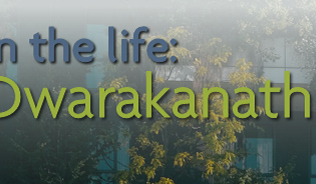Science has historically played a key role in the curation of knowledge and understandings about the world, particularly in western society. That role comes with a significant degree of power, but also an often overlooked mandate to handle that position of authority responsibly.
Many shared understandings of the world are not always recognised for the value of their insights. Ways of knowing and ways of being exist with great variety around the world, with crucial relevance to recognising and addressing environmental challenges.
This article brings together two perspectives on ways of knowing and being which differ from an analytical scientific perspective. Supplementing our understanding with diverse sources of knowledge is critical for challenging our own perceptions and taking a systems approach to the natural world.
 The potential contribution of indigenous knowledge and ways of being to human and ecological survival
The potential contribution of indigenous knowledge and ways of being to human and ecological survival
Judy Ling Wong CBE, Honorary President, Black Environment Network
My expertise is in multicultural environmental participation. On the one hand, I promote the essence of indigenous positioning across various dimensions in accessible language that people in the mainstream population can relate to, often without even mentioning the word “indigenous”.
On the other hand, I tell stories to illuminate issues and to reveal particular indigenous ways of seeing and being, deliberately opening up the territory for intercultural engagement. This paper aims to fuel discussion.
On the societal front, not caring is a big theme. A deeper purposeful exploration and use of indigenous knowledge and concepts, what I call “cultural visions”, can strategically awaken mainstream experts and citizens to a more intense human identification with nature, leading to behaviour change that can unlock a vast missing contribution to nature.
On the scientific front, an increase in the study of practical indigenous ways of caring and protecting nature, before it is lost due to the pressure of the 21st century, can be a significant move. Intercultural skills gained through relating to UK minorities can support international dialogue.
A. Useful ways of seeing that reposition environmental participation
- There is no such thing as a purely environmental initiative. A so-called purely environmental initiative is one that has rejected its social, cultural and economic dimensions.
- The potential to be more intensely human in forming the two fundamental pillars of sustainable development that informs action:
- The relationship of people to nature – merging with and identification with nature goes beyond relating to nature – damage to nature damages the self and body.
- The relationship of people to each other – science tells us that humanity is one single blood-related family. Our ultimate place of heritage is Africa.
B. Operational paradigms, processes and principles
- People for nature and nature for people are a two-way street– benefit from nature and contribution to nature are intertwined.
- We love what we enjoy and we protect what we love, informing the process of moving from ‘access’ to ‘contact with nature’ to ‘impassioned contribution’.
- Purposefully using cultural context to build impetus for environmental actions.
- Change is the coming together of thinking, feeling and action.
C. Multiculturalism as a significant context within local and global action
- UK ethnic minorities are a continuation of global majorities in the world (the world white population is 11%).
- Worldwide collaboration requires intercultural skills and understanding which can be gained through engaging with UK ethnic communities.
- Everyday engagement and actions (active prevention and management of the environment as part of taking care of ourselves) goes beyond ‘crisis interventions’.
- Recognition that various forms of indigenous knowledge rival science-based solutions.
- 80% of remaining wilderness are in indigenous hands.
D. Equality, diversity and inclusion
- Who we are and what we can achieve depends on how we see ourselves against the enormous pressure of how others see us (inclusive organisational culture).
- Moving beyond EDI into cultural richness, using cultural visions to expand ways of knowing and being that enhance quality of life and protect nature and people.
- EDI benefits everyone – beyond ethnicity into broad use of the term ‘diversity’.
 Different ways of knowing
Different ways of knowing
Professor Mark Everard
There are many different ways of knowing. The ways we understand and interact with each other, the natural world and how we use and share it is profoundly influenced by our ways of knowing.
A western, analytical world view tends to the scientific and deterministic, reflected for example in much of our regulations and supporting numeric standards. Yet the reality of our daily western lives – relationships, home and social interactions, pets, superstitions – is anything but of this character.
Animist world views have remarkable similarities across the world. From flows of chi in Tao, kami in Shinto and brahmin in the Hindu traditions, spirit is in all things. The ways in which we interact with the world, including with each other, can have more or less spiritual content. The quality of landscapes, artefacts, artworks, products and relationships also embodies more or less spirit.
The ways in which we ‘brand’ these diverse traditions as ‘religions’ is itself often a rather crude western generalisation. ‘Hindu’ simply means ‘beyond the Indus’, sweeping up a huge diversity of beliefs, deities and traditions across a whole subcontinent. Many embody a way of knowing that see virtue in nature and natural order, community harmony and everyday interactions, rather than a more simplistic prayer or appeal to a monotheistic godhead. (In animist traditions, the work of the creator is manifest in all of creation, and the journey is of respecting and optimising that.)
We see different types of music, art and ways of expressing that extend far deeper than simple linguistic differences between cultures, many reflecting connections with nature and its processes.
My work with water management in India is illustrative. Thousands of years of locally nuanced solutions and community collaboration to detain episodic monsoon rainfall, recharging shallow groundwater for year-round access and equitable sharing, has enabled self-sufficiency, built upon working with nature and its processes and with others. More recent ‘efficient’ western technology (tube wells, dam-and-transfer) taps nature without recharge, breaking down communal cohesion as people complete to exploit water. Only now, in crisis, are Indian policy-makers recognising the need to restore traditional wisdoms – including traditional practices but also modern innovations based on those wisdoms to reflect modern population levels – if India is to address mounting water stress.
We need those close understandings and synergy with multi-beneficial ecosystem processes – deep harmony with nature – and respect and equity within communities at all scales from the village to the globe if sustainability is to be achieved. This applies not just to water and not just to India, but globally in terms of the way we farm, fish, manufacture, travel, manage flood risk, perceive resource security as the root of peace-keeping, and indeed innovate across all spheres of human activity.
As scientists increasingly map ecosystem interdependencies, contributions of ecosystem services to differing dimensions of human wellbeing, feedback loops from our actions to ecosystem-vectored consequences and distributional equity, we see more of the systemic context implicit in animism.
Our ways of knowing can obscure or unfold ways of seeing, understanding, acting, and engaging and communicating... a more immersed form of knowing is never more vital as we seek a sustainable future in which humanity seeks harmonious relationships with the natural world and with itself.
What next?
In 2024, the IES will be using these perspectives as part of a provocation paper to inform ongoing discussions about different ways of knowing and being, forming part of our environmental policy work on the theme of ‘knowledge for environmental policy’.
Find out more about environmental science, environmental justice, and the work of the IES:
- Read ‘Seeking Natural Justice’, our latest open access journal on environmental justice
- Join the IES as a member, or support the IES by joining as an Affiliate
- Find out more about our Equity, Diversity and Inclusion Plan 2023 - 2026
- Read ‘Transforming the planet’ to learn more about the future of environmental science and the need for greater equality, diversity, and inclusion
As this work continues throughout 2024, the perspectives of IES members will be crucial to ensuring a broad discussion. Get in touch to share your perspective or to get involved in our work on knowledge for environmental policy.
The IES will continue to bring science together with different perspectives to help people to solve environmental challenges and co-create a sustainable society where people and nature thrive.





